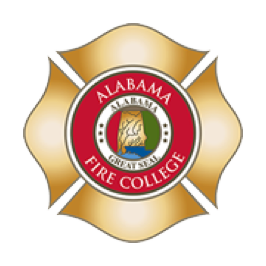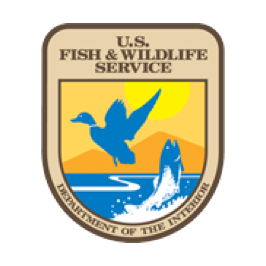Spring 2022 – From The Eagle’s Nest Newsletter
From the Eagle’s Nest
Spring 2022
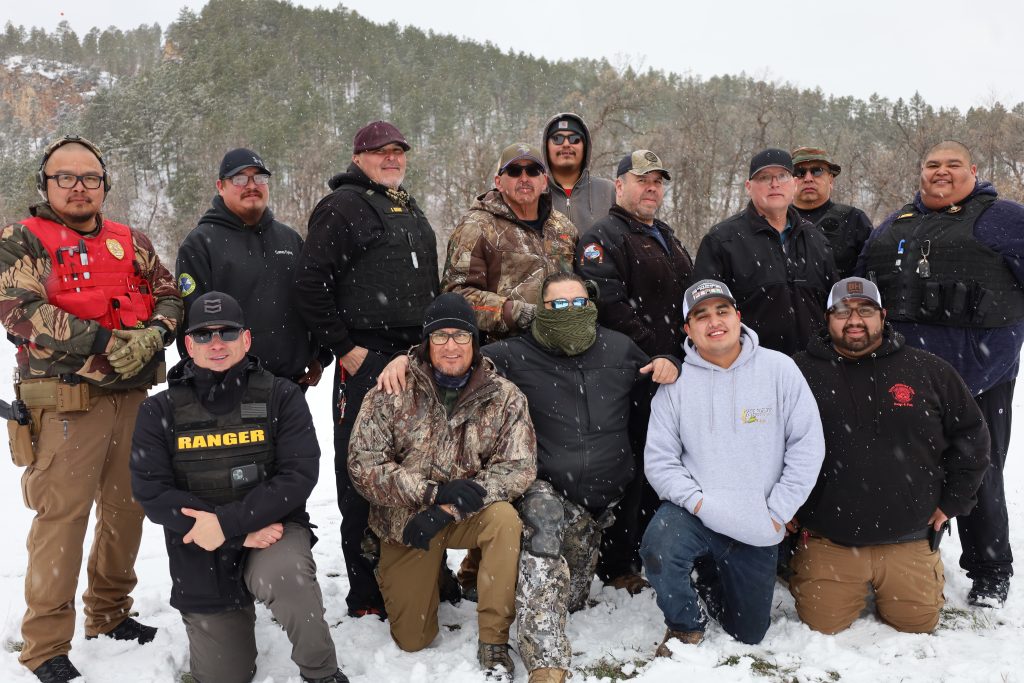
Conservation law enforcement officers competed in the Great Plains Regional Qualification and Shoot Competition.
Featured Articles
Message from the President
Message from the Executive Director
NAFWS Enters into a Memorandum of Understanding with USFW
New NAFWS Hunter’s Education Program
Doing More with Less: Inequities in Tribal Fish & Wildlife Funding
Great Plains Regional Conference
NAFWS Welcomes New Staff
NAFWS Enters Contract with Native Healing, LLC
Upcoming Events: 39th Annual National Conference & 5k Swamp Run/Walk
2022 National Initiatives
Student Opportunities & Education Updates
Conservation Law Enforcement Officer Updates
Fish & Wildlife News: Invasive Species, Wildlife Disease, and Endangered Species
NAFWS in the News
Message from the President
It’s Springtime! We’re trying to figure it out here at Walker River. One day it’s cold, the next it’s in the 80’s, but mainly the wind is blowing like crazy. There is change in the air and it’s good to see plants starting to grow and turn green. We are experiencing a severe drought and know that this summer is going to be hard for the fish and our range lands are going to suffer. These types of years are hard on all plants and animals.
We have a lot of good and positive happenings with the Society. We just received more than $450,000 the USFWS through a self-determination contract that was announced publicly by Secretary Haaland on April 7th. This funding will allow us to hire additional biologists and secure existing staff.
We have several opportunities coming up for students. The application period for our in-person National Summer Youth Practicum (SYP) just closed and the Southwest Region SYP is in the planning process. Scholarships for all regions are being advertised now. Please encourage your college students to apply.
Our in-person 2022 Regional and National Conferences are rapidly approaching. The Great Plains just held their conference in early April in Deadwood, South Dakota and had 80 participants. The Southwest Region will be holding their conference at the Santa Ana Pueblo, NM from August 15-18, 2022, the Pacific Region will hold theirs in Loleta, CA from August 22-25, 2022, and the Great Lakes Region conference will be held September 18-23, 2022. The Alaska and Northeast Regions will hold regional meetings in October.
The 2022 Annual National Conference is May 9-12, 2022 in Miami, FL sponsored by the Southeast Region and the Miccosukee Tribe of Indians of Florida. Please make your travel plans!
Lastly, we’re hoping that RAWA will pass through Congress soon; cross your fingers. This would be a game changer and benefit tribes with building capacity within their fish, wildlife, and conservation programs.
Julie and staff are busy with moving our Society forward. Please visit our website at NAFWS.org to get the updates and information.
Continue to stay healthy
Elveda Martinez
President & SW Regional Director
Message from the Executive Director
Greetings NAFWS members, partners, and friends. We are off to a great start with some sense of “normalcy” returning. We welcomed three new employees to our NAFWS team since January, Shailyn Miller, Wildlife Connectivity Coordinator, Laurel James, Director of Programs and Justin Leon, Sr. Tribal Climate Resilience Liaison.
We have been extremely busy since the start of the year. We completed the Tribal Fish and Wildlife Status Report for the Lower 48 States and the 2021 Annual Report and Annual Membership Report. I hope these reports help showcase the needs in Tribal Fish and Wildlife programming as well as the hard work NAFWS is doing.
We also announced our 2022 National Initiatives – Climate Change, Recovering America’s Wildlife Act, Tribal Conservation Law Enforcement Program Enhancement, Tribal Wildlife Corridors, and Wildlife Health.
2022 National Initiatives Updates
The Recovering America’s Wildlife Act (RAWA) continues to gain bipartisan support with 171 cosponsors in the House (HR 2773) and 32 cosponsors in the Senate (S 2372). On April 7, 2022, RAWA passed 15-5 in the Senate Environmental and Public Works Committee. We are now moving forward to a vote in both the House and Senate. We continue to educate on the importance of Recovering for Tribes as a step forward in inequities in funding and finally a BASE funding source for Tribal fish and wildlife programs. Read the article we published to raise awareness of how RAWA will impact Tribes.
Our Tribal Wildlife Corridors/Connectivity National Initiative is moving forward on many fronts largely due to Shailyn Miller’s dedication to engaging Tribes. The Tribal Wildlife Corridors Act has gained two cosponsors in the Senate, however, there is much work yet to be done. Shailyn has connected with 60 Tribes that are doing or interested in wildlife corridors and connectivity. We are also working with several partners including, NWF, TRCP and CLLC, on the Federal Highways’ pilot program for corridors through the infrastructure bill.
With travel and Covid restrictions easing, we are again out in the field hosting Conservation Law Enforcement Officer trainings. We continue to advertise for a CLEO intern to help analyze the survey data we collected last year on Tribes’ CLEO needs and priorities.
We are extremely excited to increase our membership value for our Alaska Tribes through the BIA Tribal Climate Resilience Grant. Justin Leon is off to a great start in collaboration with the BIA and USGS on shared priorities around climate change and adaptability for Alaska Tribes.
The Wildlife Health National Initiative encompasses many serious threats to Tribal resources and human health. We are excited to announce NAFWS has entered a contract with Native Healing, LLC Dr. Tolani Francisco to provide technical assistance to NAFWS member Tribes and individual members with an emphasis on zoonotic diseases.
Please check out our website as we continue to add resources about our National Initiatives along with several projects we are working on.
It feels good to be out in Indian Country again and hearing and witnessing all of the incredible work Tribes are doing for fish and wildlife. I feel very blessed to have spent some time in the homelands of the Menominee Indian Nation and assist NAFWS Great Lakes Regional Director Don Reiter with his bear project. It was also an honor to be part of the first Empowering Indigenous Environments Conference hosted by the Bear River Band of Rohnerville Rancheria Tribe in California. I hope to see many of you at our 39th Annual NAFWS National Conference hosted by the Miccosukee Tribe in Miami, FL May 9-13, 2022. As always, if you have ideas for the NAFWS, please contact me or your regional director(s).
I hope our paths cross soon.
Pilamaye ye,
Julie Thorstenson, PhD
Executive Director
NAFWS Enters into a Memorandum of Understanding with USFWS
Agreement to increase Tribes’ access to conservation resources
See the Press Release.
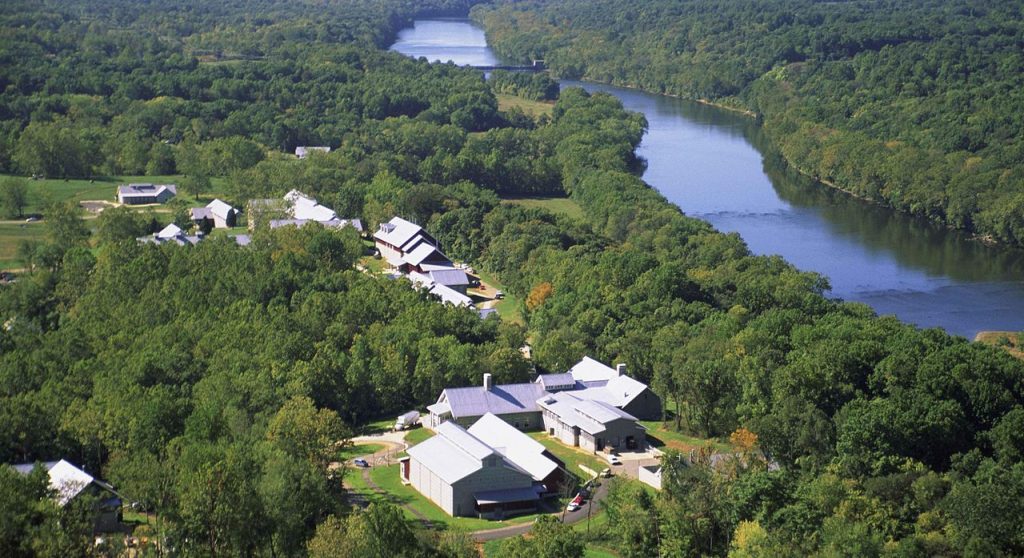
The NCTC training center (USFWS).
April 19, 2022 – The Native American Fish and Wildlife Society (NAFWS) and the U.S. Department of the Interior, U.S. Fish and Wildlife Service (USFWS) entered into a Memorandum of Understanding (MOU) on January 18, 2022. The MOU will increase collaboration to coordinate support, involvement, and utilization of the National Conservation Training Center.
The USFWS National Conservation Training Center’s (NCTC) 533-acre campus is located outside of Washington, DC metro area in Shepherdstown, West Virginia. Conservation professionals meet both in-person and virtually through NCTC for trainings in habitat assessment, wildlife biology field techniques, safety and emergency response, policy, communications, and more. The NCTC also provides a wide variety of resources through the USFWS Conservation Library.
“NAFWS is excited to announce a MOU with the USFWS,” said NAFWS Executive Director Julie Thorstenson, PhD, “Tribal fish and wildlife professionals often identify access to trainings and publications as a barrier to conservation work. This MOU provides Tribal governments and their staff access to NCTC fish and wildlife resource training programs along with access to a broad range of scientific literature through USFWS library services while providing Tribal input on the types of trainings needed. This MOU provides a much-needed resource to Tribal fish and wildlife professionals.”
Since its establishment, the NCTC has welcomed Tribal Nations to the training center. The USFWS has offered training courses on Tribal lands and has hosted the Native Youth Climate Adaptation Leadership Congress since 2015. However, with limited vouchers available, tuition, transportation, and lodging costs are major barriers to Tribes participating in the program. The memorandum seeks to improve the access and relevance of NCTC resources for Tribes.
“We are thrilled to strengthen our partnership and collaboration with Tribal wildlife agencies,” said U.S. Fish and Wildlife Service Director Martha Williams. “This new MOU will bring an increased exchange of knowledge – including cultural and ecological –ultimately benefitting partners, fish, wildlife, and habitats.”
Utilizing the NCTC, NAFWS and USFWS will develop and facilitate direct training and support for Tribal natural resources employees. NAFWS members will also have access to the training center’s library with more than 20,000 professional and scientific journals, 400 recorded training videos and webinars, a growing collection of 9,000 books and eBooks, and USFWS’ gray literature.
This collaboration will foster better communications and increased collaboration between Tribal and federal agencies. It is also an opportunity for the incorporation of Traditional Ecological Knowledge (TEK) and the expertise of Tribal governments into policy, agency actions, and determinations that have Tribal implications.
The Memorandum of Understanding between the USFWS and NAFWS is a step in the right direction to build capacity in Tribal fish and wildlife programs, while allowing for Tribal input.
New NAFWS Hunter’s Education Program
During the Bureau of Indian Affairs Great Plains Wildlife and Parks coordination call, an inquiry was made to the NAFWS staff about developing a hunter’s education course through the Society as an alternative to utilizing the state systems. As a result of this request, NAFWS Fish and Wildlife Biologist Sean Cross was tasked with developing the NAFWS Hunter’s Education Program
Sean identified that the International Hunter’s Education Association (IHEA) set and maintains the hunter’s education standards that are currently in use. The IHEA developed a basic course that has been adopted by all 50 states and 18 foreign countries – meaning a course taken in one state is recognized by all other participating states and nations. After working with the IHEA Executive Director, it was determined that the IHEA certification system will easily incorporate a NAFWS sponsored course that can be conducted in collaboration with any tribe who wants to take advantage of the program.
The IHEA course curriculum has 10 standard requirements: Justification for Hunter Education and Hunting, Safe Firearms Mechanical Handling, Safe Firearm Field Practices, Hunting Regulations, Wildlife Identification, Key Wildlife and Management Principles, Hunter’s Role in Conservation, Responsibility to Wildlife, Hunter Best Practices, and Personal Responsibility and Behavior. Tribal Fish and Wildlife Departments have the option to customize additional material specific to their needs. The traditional method of an instructor lead course is available along with virtual options.
Doing More with Less: Inequities in Tribal Fish & Wildlife Funding
The Recovering America’s Wildlife Act is a step towards funding equity
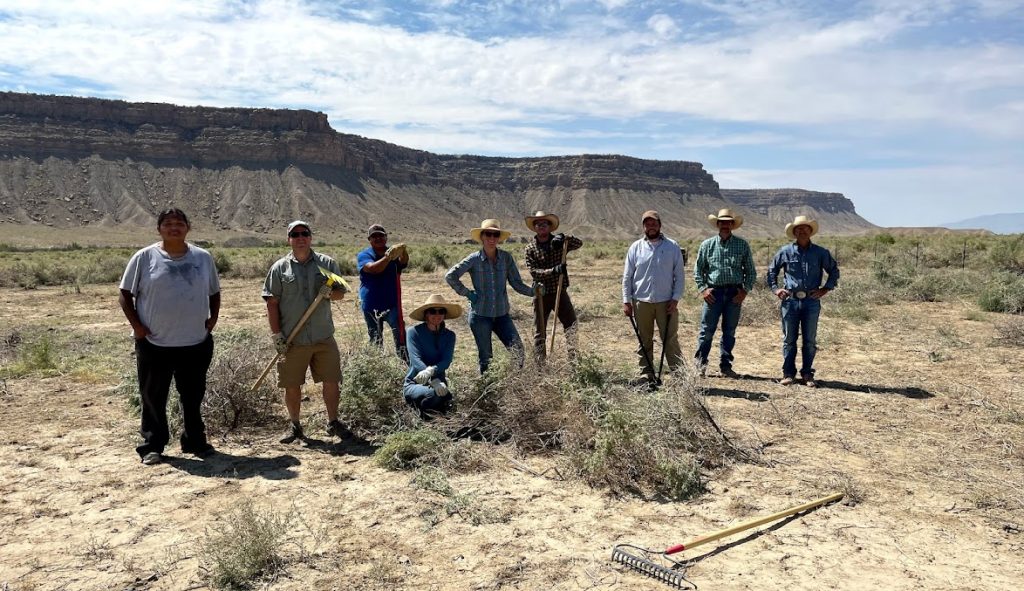
Ute Mountain Ute staff and partnering universities design study of dryland restoration strategies in the Mancos Canyon.
There are 574 federally recognized Tribes in the United States. Tribes own or influence the management of nearly 140 million acres. These lands and waters provide habitat for fish and wildlife, including more than 500 species listed as threatened or endangered, as well as first foods, medicines, and cultural and sacred sites for native people. Despite the importance of Tribal natural resource management and role as the first stewards of these lands and waters, there is no dedicated, annual, base-funding for Tribal fish and wildlife management.
For decades, Tribes have been left out of conservation funding opportunities or they are forced to compete for nonrecurring and often inadequate grant funding. One example is the Tribal Wildlife Grants Program (TWG) that is awarded through the U.S. Fish & Wildlife Service (USFWS). While hugely beneficial for the Tribes who receive them, the USFWS receives limited funds each year for the program. In 2021, the program funded 37 (roughly 6%) of the 574 federally recognized Tribes. The labor intensive and highly competitive program leaves many Tribes reluctant to apply, while others simply do not have the capacity to apply.
In 2019, legislation was introduced into Congress, that if passed, would be the first to build Tribal conservation management capacity through secured annual funding. The Recovering America’s Wildlife Act (H.R. 2773, S. 2372) aims to address the shortfall in fish and wildlife conservation funding. The proposed legislation would dedicate $97.5 million to Tribal Nations and $1.3 billion to state agencies to address the need for proactive management to protect the 12,000 fish and wildlife species identified as in greatest conservation need.
Great diversity exists within Tribal fish and wildlife programs. There are Tribes with very well-established programs with large staff and multiple divisions including research, cultural preservation, and animal sanctuaries. Others have no program or are in the beginning stages of developing a program. Each Tribe has unique program goals, priorities, and challenges. Common themes around capacity emerge for a large majority of the Tribes the Native American Fish and Wildlife Society works with – funding instability, staff shortages, and a reliance on grant funding. While it will not address the long history of funding inequities, the Recovering America’s Wildlife Act is an opportunity to begin addressing funding gaps, grow Tribal conservation programs, and improve co-management efforts.
Great Plains Regional Conference
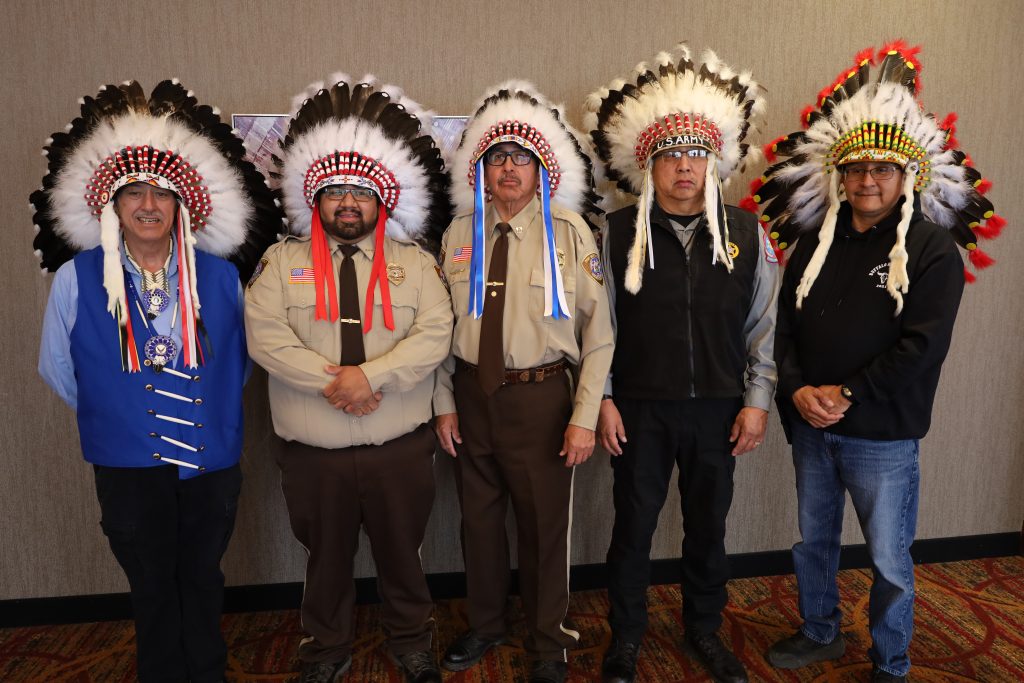
The 2022 Great Plains Regional Conference took place April 6-7, 2022 in Deadwood, SD at the Deadwood Lodge. Great Plains Regional Directors Jeff Kelly and Charles Wilkinson welcomed more than 80 attendees. Chairwoman of the Standing Rock Sioux Tribe, Janet Alkire, delivered the keynote speech inspiring the audience sharing the accomplishments and challenges on the Standing Rock Reservation and the need for collaboration to restore and protect the plains. Attendees also enjoyed presentations on restoration and reintroduction efforts in the Great Plains Region, wildlife disease updates, innovative management tools, and upcoming NAFWS projects. We were also fortunate to have a dinner hosted by the Central Grasslands Road Map and American Bird Conservancy. Conservation Law Enforcement Officers attended trainings in officer and agency wellness and competed in the Great Plains Regional Qualification and Shoot Competition.
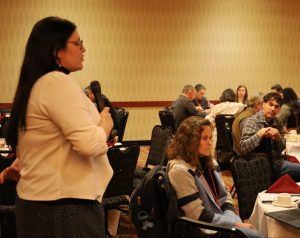 At the banquet, the winners of the Great Plains Shoot Competition were announced. Beaufort Joe of Three Affiliated Tribes Fish & Wildlife Division took home Top Gun. He will be joined by Jeff Kelly, Morgan Tibbits, Larry Brown, and Jordan Yellow Bird to compete at the NAFWS National Shoot Competition at the 2022 Annual National Conference. Timothy Vosburgh of the Fort Belknap Fish and Game Department was awarded Biologist of the Year for his many years of commitment to the Fort Belknap Indian Community. Waylon Little Eagle and Thomas DeLong of Standing Rock Sioux Tribe Game and Fish were awarded Conservation Officers of the Year. Jeff Kelly was re-elected as Great Plains Regional Director.
At the banquet, the winners of the Great Plains Shoot Competition were announced. Beaufort Joe of Three Affiliated Tribes Fish & Wildlife Division took home Top Gun. He will be joined by Jeff Kelly, Morgan Tibbits, Larry Brown, and Jordan Yellow Bird to compete at the NAFWS National Shoot Competition at the 2022 Annual National Conference. Timothy Vosburgh of the Fort Belknap Fish and Game Department was awarded Biologist of the Year for his many years of commitment to the Fort Belknap Indian Community. Waylon Little Eagle and Thomas DeLong of Standing Rock Sioux Tribe Game and Fish were awarded Conservation Officers of the Year. Jeff Kelly was re-elected as Great Plains Regional Director.
NAFWS Welcomes New Staff
NAFWS is pleased to announce that Laurel James and Justin Leon are joining our team. After serving as Pacific Region Director for two years, Laurel stepped into the Program Director position on January 31st. Justin Leon is joining NAFWS as the Senior Tribal Climate Resilience Liaison for the Alaska Region.
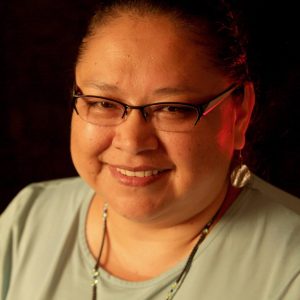 Laurel James is an enrolled member of the Yakama Nation and an Interdisciplinary PhD Candidate at the University of Washington in the School of Environmental & Forest Sciences and the Department of Anthropology. She also holds a MS Degree in Fire Ecology and a BS degree in Wildlife Science. Laurel has worked her entire career in the field of Natural Resources beginning as a wildland firefighter (engine, helitack & hotshot) then mostly in Wildlife Resources (endangered species, timber sales and NEPA assessments). She was a member of the 2012 Indian Forest Management Assessment Team (IFMAT), as a graduate student observer and was recognized for her work with Tribal Communities in receiving the State of Washington, E3 (Education-Environment-Economy) Green Apple Award for Diversity in Action in 2013. Laurel continues to pursue her Interdisciplinary PhD at the University of Washington and her dissertation focuses on a Forest History for the Confederated Salish & Kootenai Tribes. As the Director of Programs for NAFWS, Laurel is excited to work with Natural Resource professionals, across the nation!
Laurel James is an enrolled member of the Yakama Nation and an Interdisciplinary PhD Candidate at the University of Washington in the School of Environmental & Forest Sciences and the Department of Anthropology. She also holds a MS Degree in Fire Ecology and a BS degree in Wildlife Science. Laurel has worked her entire career in the field of Natural Resources beginning as a wildland firefighter (engine, helitack & hotshot) then mostly in Wildlife Resources (endangered species, timber sales and NEPA assessments). She was a member of the 2012 Indian Forest Management Assessment Team (IFMAT), as a graduate student observer and was recognized for her work with Tribal Communities in receiving the State of Washington, E3 (Education-Environment-Economy) Green Apple Award for Diversity in Action in 2013. Laurel continues to pursue her Interdisciplinary PhD at the University of Washington and her dissertation focuses on a Forest History for the Confederated Salish & Kootenai Tribes. As the Director of Programs for NAFWS, Laurel is excited to work with Natural Resource professionals, across the nation!
 Justin was born and raised in Georgia, where he obtained his B.S. from the University of Georgia in wildlife management. He moved to Alaska after graduating in 2008 and has made Alaska home since then. He obtained his M.S. in fisheries from the University of Alaska Fairbanks, where he focused on Chinook salmon in the Yukon and Kuskokwim rivers. He comes to the Native American Fish & Wildlife Society after spending 10 years as a fishery biologist for the Alaska Department of Fish and Game. As a fishery biologist, he worked with crab and salmon research, and wild fisheries stock management in Northwest Alaska, the Alaskan interior, and the Aleutian Islands. He lives in Nome, Alaska with his wife and two children. He enjoys hiking, hunting, fishing, foraging, and spending time with his family in his free time.
Justin was born and raised in Georgia, where he obtained his B.S. from the University of Georgia in wildlife management. He moved to Alaska after graduating in 2008 and has made Alaska home since then. He obtained his M.S. in fisheries from the University of Alaska Fairbanks, where he focused on Chinook salmon in the Yukon and Kuskokwim rivers. He comes to the Native American Fish & Wildlife Society after spending 10 years as a fishery biologist for the Alaska Department of Fish and Game. As a fishery biologist, he worked with crab and salmon research, and wild fisheries stock management in Northwest Alaska, the Alaskan interior, and the Aleutian Islands. He lives in Nome, Alaska with his wife and two children. He enjoys hiking, hunting, fishing, foraging, and spending time with his family in his free time.
NAFWS Enters Contract with Native Healing, LLC
On April 1st, NAFWS entered into a contract with Native Healing, LLC, a veterinary hospital run out of Laguna, NM run by Dr. Tolani Francisco. Dr. Francisco will join NAFWS to provide wildlife disease consulting services to Tribes.
Among her many achievements, Dr. Francisco was the second Native American woman to receive a Doctor of Veterinary Medicine Degree. Read her biography.
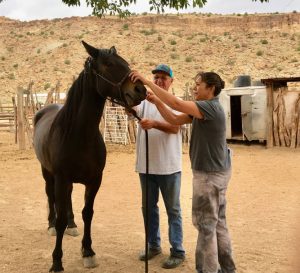
Among her many achievements, Dr. Francisco was the second Native American woman to receive a Doctor of Veterinary Medicine Degree graduating in 1990 from the Kansas State University’s College of Veterinary Medicine. She is a mixed animal practitioner who holds licenses in New Mexico, Colorado and Arizona. She started in private practice in Reno, Nevada. She has worked for the USDA, APHIS, VS in Helena, MT, Albuquerque, NM, Trinidad, Bolivia and Lakewood, CO. In 2001, she heard the call and joined the US Air Force as a Public Health Officer, rose to the rank of Major. While in the Air Force, she obtained her Master’s Degree in Public Health from Walden University. In 2017 she transferred to the USDA Forest Service in Albuquerque, NM as the SW regional Wild Horse and Burro Coordinator. In 2016, while home visiting, she established Native Healing LLC to provide free/low-cost veterinary care to all animals on tribal lands. In 2020, Native Healing was granted 501(c)3 status and is a Non-profit organization with hopes to put a small clinic on all tribal lands across the US. These clinics would house volunteer veterinarians and technicians for a week at a time to provide care to tribal animals who otherwise would have no ability to receive veterinary care. Nearly every Saturday the Native Healing clinic is open at the Pueblo of Laguna and is currently serving animals from Laguna, Acoma, Isleta, San Filipe, Zia and Santo Domingo Pueblos.
Upcoming Events
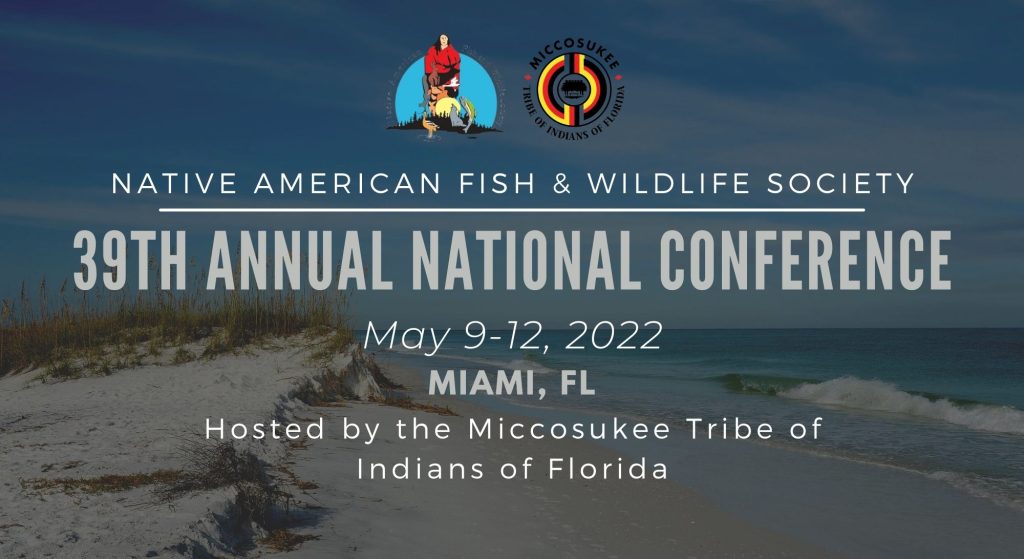
The 39th Annual National Conference is rapidly approaching. The conference will be a hybrid event held May 9-12, 2022 hosted by the Miccosukee Tribe of Indians of Florida at Miccosukee Resort & Gaming in Miami, FL. The conference will be held May 9-12, 2022, hosted by the Miccosukee Tribe at Miccosukee Resort & Gaming in Miami, FL. Submit Memorial Requests and nominations for Conservation Officer of the Year by April 29th, 2022.
Can’t attend in person? Join Virtually!
The conference is a hybrid event with the option to attend many events virtually. Registration is free to members!
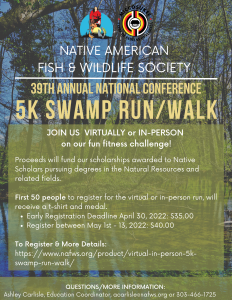 5K SWAMP RUN/WALK
5K SWAMP RUN/WALK
Join us VIRTUALLY or IN-PERSON for the 5k Swamp Run/Walk to raise funds for our scholarships awarded to Native Scholars pursuing degrees in natural resources and related fields.
Participate in-person Thursday, May 12 at 6:30 am – 8:30 am at the 2022 NAFWS Annual National Conference in Miami, FL. Participate virtually anytime Sunday, May 1 – Tuesday May 31, 2022.
First 50 people to register for the virtual or in-person run, will receive a t-shirt and medal! We will post a photo of them once they are available. If you have any questions, please contact: Ashley Carlisle, Education Coordinator.
Program Updates
2022 National Initiatives
Learn about the 2022 NAFWS National Initiatives
- Climate Change
- Recovering America’s Wildlife Act
- Tribal Conservation Law Enforcement Program Enhancement
- Tribal Wildlife Corridors
- Wildlife Health
Student Opportunities & Education Updates
Ashley Carlisle, Education Coordinator
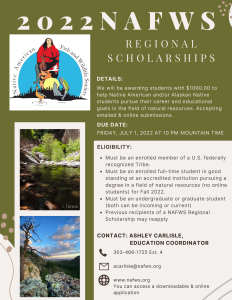
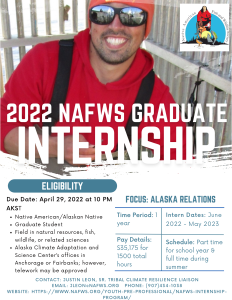
Happy Spring All! NAFWS Education Programming is going great!
The National Student Youth Practicum application deadline has closed, and we have a great group of applications to review! This year’s National SYP will be held in two locations, the Colorado State University’s Mountain Campus and Estes Park, Colorado. A few awesome activities on the agenda include a high ropes course, elk management exercise with Rocky Mountain National Park and lunch at CSU’s Pawnee Grassland Room that features the history and culture of Arapaho, Cheyenne, Lakota, and Pawnee that had occupied Northern Colorado.
We have several opportunities available for students at the 2022 39th Annual National Conference in Miami. As part of our youth programming, we are funding five incredible individuals to participate and attend the conference through our 2022 Student Conference Travel Scholarship. Students will present their research at our Tribal Student and Professional Mixer and Poster Session on Wednesday, May 11th. As an attendee of the conference, we invite and encourage you to attend the session and meet these emerging professionals.
We will also have our first formal Research/Publication Ad-hoc Committee meeting in Miami. Through numerous conversations, we formed the committee to address topics such as data sovereignty, literature, and publication access, and much more! If you are interested, please come to the meeting at the national conference.
Applications are now open for the NAFWS Regional Scholarships due July 1, 2022 at 10PM Mountain Time. We are also accepting applications for a CLEO Summer Intern and an Alaska Tribal Climate Resilience Graduate Intern, we are excited to be a part of their education journey. Lastly, I am holding a year-long Professional Development Webinar Series the 3rd Thursday of each month. Please share, register and/or attend! It is open and free to everyone.
Conservation Law Enforcement Update
Robert Romero, CLEO Consultant
Greetings everyone! I hope you all continue to stay safe and remain healthy.
It has been a busy few months for me with most of my time dedicated to coordinating and planning CLEO training for various in-person conferences, meetings and training scheduled through the fall of 2022. Yes, all in-person events!
We had a 2-day, Southwest Region CLEO Training March 29-30, 2022 in Mescalero, NM hosted by the Mescalero Apache Tribe at the Inn of the Mountain Gods. Tribal officers from the Navajo Nation, Round Valley Indian Tribe, Taos Pueblo, Santa Ana Pueblo, San Carlos Apache Tribe, Hopi Tribe, Jicarilla Apache Tribe and the Mescalero Apache Tribe participated in one day of firearms training in collaboration with the U.S. Fish and Wildlife Service/Office of Law Enforcement (FWS/OLE) that will include a Practical Pistol Competition (PPC) to establish a 2022 Southwest Region Shoot Team that will compete against other regional shoot teams at the 2022 NAFWS Annual National Conference in Miami, FL. The second day of training will consist of classroom presentations covering officer wellness, Lacey Act and other Federal wildlife statues, and legal updates lead by instructors from the Alamogordo Police Department, FWS/OLE and the DOJs U.S. Attorney’s Office.
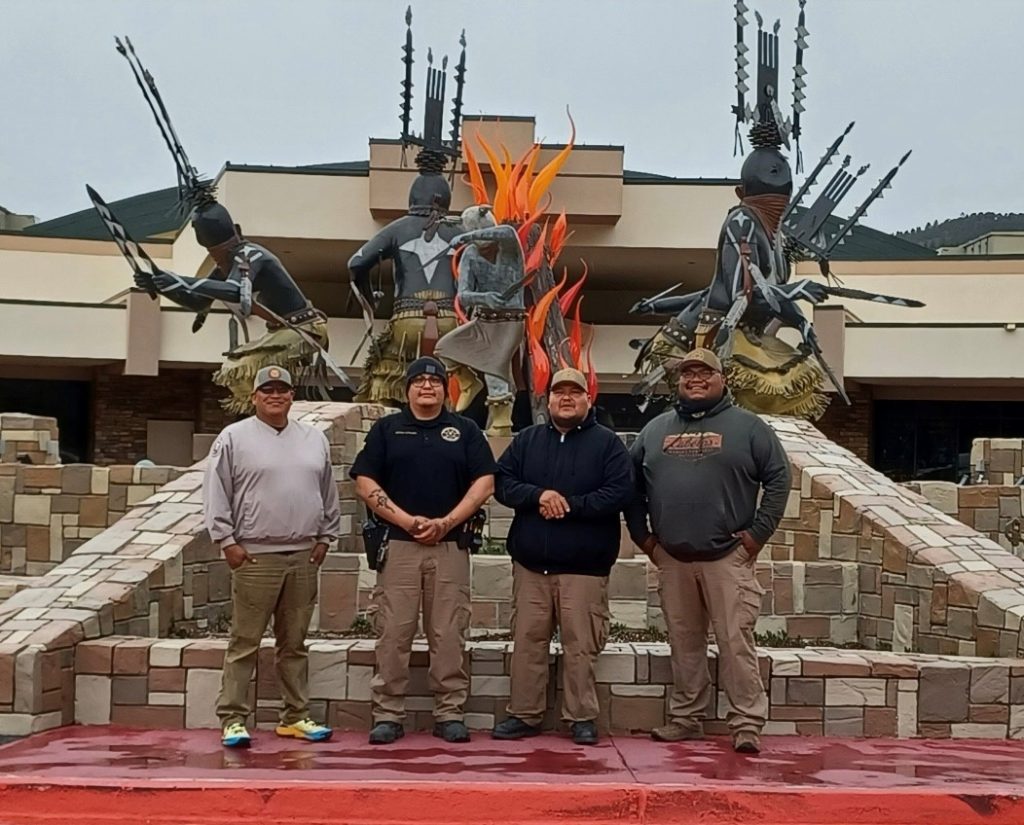
The team representing the Southwest Region at the 2022 Annual National Conference.
The 2022 Great Plains Regional Conference was held at the Deadwood Lodge, Spearfish, SD from April 6-7, 2022 and will also include a PPC to establish a 2022 Great Plains Regional Shoot Team to compete in the National shoot. CLEOs also received a full day of Officer and Agency Wellness – Hiring and Retiring Healthy training that will be presented by the Dolan Consulting Group.
Planning continues to complete training agendas for:
- 2022 NAFWS Annual National Conference in Miami, FL, May 9-12;
- NAFWS 40-hour CLEO Training in Billings, MT, June 20-24;
- Great Lakes Chief’s Meeting at the Shakopee Mdewakanton Sioux Community,
July 24-28;
- Southwest Regional Conference at the Santa Ana Pueblo, August 15-19;
- Pacific and Alaska Regional Conferences, dates TBD
We have also finalized an agreement between the NAFWS and the Great Lakes Drone Company to provide Federal Aviation Administration Part 107 and other training/support for members interested in obtaining a pilot license to conduct Unmanned Aircraft Systems operations in Indian country for both law enforcement and non-law enforcement programs. NAFWS staff will work to schedule training dates in the near future. If your department is interested in hosting this training, please contact me or Sean Cross to discuss further.
The Tribal Conservation Law Enforcement Program continues to evolve through collaboration with our existing partners and building relationships with others to support our member CLEOs, so if you have any questions, concerns or suggestions, please reach out to me.
As always, if you have any questions or concerns about conservation law enforcement, please feel free to contact me.
Fish & Wildlife News: Invasive Species, Wildlife Disease, and Endangered Species
This issues fish and wildlife updates include guidance for the rapidly spreading Highly Pathogenic Avian Influenza, invasive zebra mussels found in two Oklahoma lakes, and the relisting of the gray wolf.
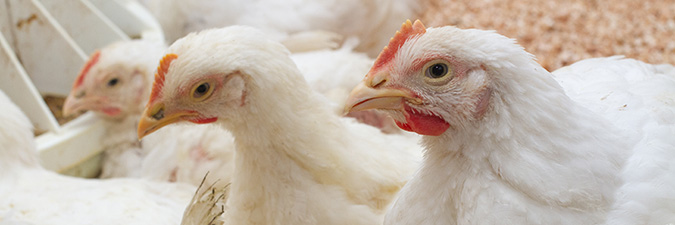
Poultry farm with chicken. Photo – USDA APHIS
Highly Pathogenic Avian Influenza
Highly Pathogenic Avian Influenza (HPAI) is a virus impacting poultry (commercial & backyard flocks) and some wild bird species causing severe disease and mortality of up to 90-100%. On rare occasions, Avian influenza (or bird flu) can also infect humans.
In November 2021, the HPAI A(H5) virus appeared in a back yard flock in the European country of Kaliningrad. During the spring and fall migration of wild birds through the 4 different flyways (Atlantic, Mississippi, Central and Pacific) birds fly thousands of miles around the globe to nesting and/or foraging grounds. These migrations aid in the global spread of HPAI. Since the initial detections, HPAI has slowly begun to spread down the eastern seaboard from Maine to Florida. Now the virus has begun moving westward.
As HPAI continues to spread, poultry raisers (backyard and commercial), hunters, and anyone who comes into contact with birds should follow biosecurity measures with the goal of minimizing spread and preventing human-animal transmission of the disease.
Visit the USDA APHIS website for information on HPAI, detections in your region, and detections in proximity to Tribal lands.
Signs of HPAI A(H5)
HPAI A(H5) infects the respiratory and gastrointestinal tracts of birds, it spreads rapidly and can cause rapid mortality in poultry. Signs include:
- Lack of energy, appetite, coordination
- Purple discoloration of certain body parts
- Diarrhea
- Nasal discharge, coughing and sneezing
- Reduced egg production
- Soft shells or misshapen eggs, and
- Sudden death
Risk Reduction and Biosecurity Measures
The highly contagious HPAI A(H5) virus can have devastating effects on both backyard and commercial poultry producers. In past HPAI outbreaks, millions of poultry have had to be culled to slow the spread of the virus. Protect your flock by taking biosecurity measures, including:
- Keep your poultry isolated from other flocks and wild birds
- Bird-proof poultry houses
- Avoid transferring poultry between barns/buildings
- Secure feed bins and water sources to avoid contamination from free flying wild birds and rodents
- Disinfect equipment
- Use foot washing stations at all entrances to clean boots before and after entering poultry barns
- Use handwashing and sanitizing stations
- Disinfect tools and poultry transports
- Require personnel to complete annual biosecurity training
- See biosecurity checklist
Guidelines for Hunters: Wild bird hunters can also utilize risk reduction strategies to protect their health and avoid spreading HPAI. These measures include:
- Do not handle or eat sick game birds.
- Keep wild bird carcasses away from poultry operations
- Clean game birds in the field.
- Wear rubber or disposable gloves while cleaning game.
- Do not eat, drink or smoke while handling wild birds.
- All game birds should be cooked thoroughly to 165 degrees Fahrenheit.
- See more guidelines
Tribes are encouraged to download a Printable HPAI Alert to post in public spaces.
Invasive Zebra Mussels in Oklahoma Lakes
The Oklahoma Department of Wildlife Conservation has confirmed that invasive zebra mussels have been identified in Lake Shawnee and Ardmore City Lake for the first time. Zebra mussels have been known to cause millions of dollars in damage to equipment and infrastructure and compete with native fish and wildlife species for food. Read more here.
Gray Wolf Re-enlisted as Endangered
Following a court order February 10, 2022 gray wolves in the contiguous 48 states and Mexico (with the exception of the Northern Rocky Mountain population) are now protected under the Endangered Species Act (ESA) as threatened in Minnesota and endangered in the remaining states. Read more.
NAFWS in the News
Crucial to conservation, Indigenous communities’ environmental leadership endures
In a special episode of the Mongabay podcast, NAFWS Executive Director Dr. Julie Thorstenson joins host Mike Gaworecki and award winning author Michelle Nijhuis to discuss the vital role of Indigenous led conservation efforts.
Tribes Could Get Boost to Protect Wildlife Migration Routes
NAFWS Wildlife Connectivity Coordinator Shailyn Miller was interviewed by the Public News Service about Tribal efforts to restore wildlife corridors and Tribal Wildlife Corridors Act.


